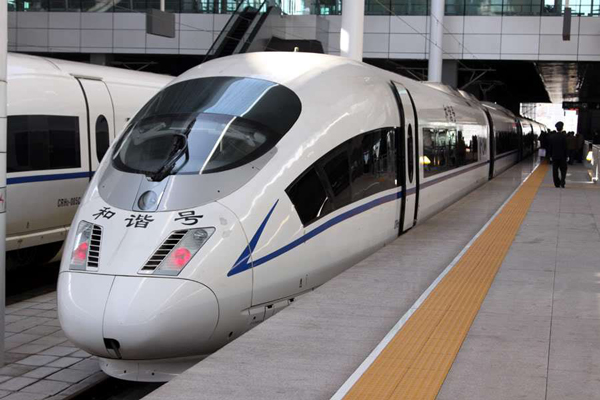當(dāng)前位置: Language Tips> 新聞播報(bào)
分享到

Exciting news emerged last week from the world's largest train manufacturer, especially for those of us who love to travel at high speed.
China Railway Rolling Stock Corp (whose parent CRRC Group is State-owned) is looking to develop a "maglev" train that will be capable of traveling at up to 600 km per hour twice as fast as the best bullet trains currently in operation.
Now, this is only an announcement and no doubt it will be some time before we see trains able to travel at half the speed of sound.
But the news got me thinking, all the same, about the dire state of rail transport in my home country.
Britain is known as the birthplace of the railways - in fact, it has one of the densest rail networks in the world.
Yet little has been done to improve or upgrade this network in decades, and much of the current rolling stock is outmoded and decrepit.
The root cause of this is the idiotic system employed by the UK, and almost nowhere else, to run the railways - something called franchising.
In a nutshell, this sees private operating companies "bid" for the rights to run rail franchises so that they can siphon off millions of pounds in profit for their shareholders, all the while being paid a subsidy by the government, which amounted to almost $5 billion between 2007 and 2011.
In the UK, our current leaders are obsessed with privatization - throwing everything they can to the wolves of the free market.
The people become inured to it, sold the lie that this system is cheaper and more efficient.
Yet the truth is, private companies perfectly adapted, as they are, for making profit can only do so much good when it comes to providing services from which little money can be wrung out.
Columnists for the likes of Bloomberg have decried China's investment in its rail network as unwise, given the heavy burden of debt it entails and the inherent difficulties in turning a profit.
True enough, going by the information that is publicly available, it would seem that State-owned China Railways Corporation only makes serious money from one line it operates the massively popular Beijing-Shanghai route.
But why should everything be boiled down to profitability?
Surely, this is the very reason for the existence of a public sector - to provide the services that, otherwise, the market would not.
Unfortunately, in Britain, nationalization is still a dirty word - the UK's left-leaning Labour Party even felt forced to scrap their commitment to it in 1995, in order to win a general election two years later.
Successive rightwing Conservative governments have regarded public ownership as a necessary evil, to be tolerated only until you can find some private interest that will take it off your hands.
Yet I would posit that when it comes to those public goods and services that are needed, but not necessarily profitable - why would you leave it to the wolves?
(編輯:董靜)
Broadcaster

Greg Fountain is a copy editor and occasional presenter for China Daily. Before moving to Beijing in January, 2016 he worked for newspapers in the Middle East and UK. He has an M.A in Print Journalism from the University of Sheffield, a B.A in English and History from the University of Reading.
上一篇 : Bit of India in China's Oscar choice
下一篇 :
分享到
關(guān)注和訂閱


口語(yǔ)
關(guān)于我們 | 聯(lián)系方式 | 招聘信息
電話:8610-84883645
傳真:8610-84883500
Email: languagetips@chinadaily.com.cn